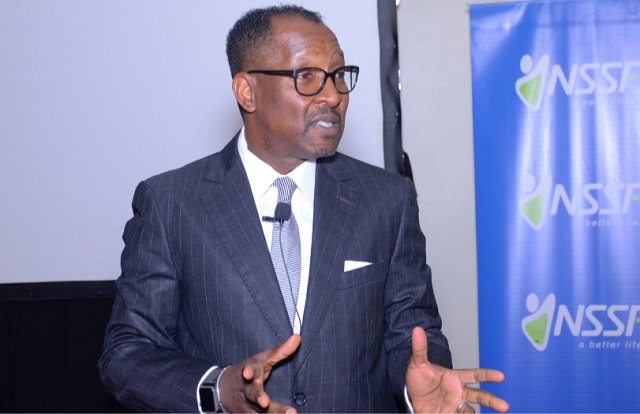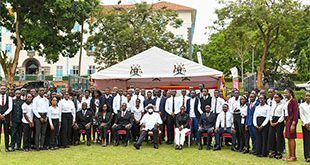
Kampala, Uganda | THE INDEPENDENT | The National Social Security Fund -NSSF, Managing Director, Richard Byarugaba says the proposed amendments to the NSSF Act, 1985 will among other things increase coverage, enhance savings, facilitate innovations and increase saver’s benefits and therefore a solution to old age poverty.
Byarugaba defended the Bill when he appeared before the joint committee of Gender and finance on Wednesday. The committee is currently scrutinizing the Bill.
The Bill seeks to among other things make it mandatory for all workers to register and contribute to NSSF, allow self-employed people to contribute to NSSF, midterm access to benefits for only voluntary members and that the NSSF board shall have a role in the appointment of the Managing Director.
Byarugaba noted that the amendments present four key solutions to respond to the evolving environment in Uganda that requires a law to expand basic social security coverage, enhance adequacy of social security benefits, enable product innovation to address the needs of a young population and strengthen the governance of the Fund.
He says the Bill is proposing amendments based on the demographic trends in Uganda where 50 percent of Uganda’s population of 34.6 million in the 2014 Census are below 15 years who are children and consumers. 45 percent of the population were shown to in the 15-54 age bracket for the working and producing bracket, while the remaining 5 percent aged above 54 years are the elderly and consumers.
Therefore, Uganda has a dilemma to ensure that the needs of the young population and the labour force are addressed in the NSSF Bill.
Uganda’s current labour force, according to Byarugaba stands at 19 million with only 20 percent ( about 3.8 million) are employed in the formal sector. Therefore, only 10 percent of the working population is under the pension cover, whereby of the 3.8 million workers in the formal sector, 1.9 million are NSSF members and the remaining 500,000 are covered by the public pension scheme.
However, the proposal that all employers and employees in the formal and informal sector must make contributions to NSSF seeks to increase coverage from the current 10 percent of members of NSSF and the public pension scheme to 100 percent.
He notes that people who are saving are not saving enough because NSSF studies show that 60 percent spent their savings on incomplete real estate projects or buying land while 50 percent of the beneficiaries exhaust their savings within one year.
Therefore, every employer irrespective of number of employees is expected to make contributions for his or her employees to NSSF and employees must register and make regular contributions to the Fund.
This proposal, if passed into law, will address the high age-dependence ratio where by the few who work have to provide for a big young population as well as the elderly.
Byarugaba adds that the Bill will also empower the Fund to innovate products and also determine benefits for members.
Currently, there are only 6 benefits, age, withdrawal for those out of employment at the age of 50, invalidity, survivors benefit, immigration grant and exempted employment.
However, the NSSF Bill provides for the Board of Directors to determine benefits for contributors, although mid term access to funds will be ring fenced for only voluntary contributors.
He says that members have been demanding for an expansion of the benefits to include health, unemployment, housing among others which however can not be met because the current Act restricts NSSF to paying out benefits in the long term.
The Bill exempts employer’s contributions and employee’s contributions below 30 percent of their income and investment income of NSSF.
He said members’ benefits shall be taxed only during payment at 55 years, while those who get paid at 60 years and above will not pay taxes on any benefit.
Byarugaba adds that the Bill, if enacted, will empower NSSF to also enforce compliance and ensure defaulting employers do not cheat employees. Currently, the Fund has to first secure a court order to ensure that third parties make contributors.
Enforcement and allowing members to top-up their contribution from the current 5 percent will enhance adequacy of benefits.
Byarugaba says that it is unfortunate that members are paid an average of shillings 15 million after saving with the Fund for about 30 years, which is inadequate for most members after retirement.
Though Pian County MP, Remegio Achia said that Byarugaba’s presentation has clarified on a number of provisions that have sparked debate among members of the public and even ministries of finance and gender, there is need for the NSSF MD to demand tax exemptions for all pension scheme members by amending the Pensions Act, 1964.
Achia asked Byarugaba, “In respect to your proposal on expanding social security coverage from 10 percent to 100 percent, what happens to other occupational or voluntary schemes? Why do yo want to kill them?
Achia’s reservations on the monopoly of NSSF is also one of the objections Ministry of finance and Bank of Uganda has expressed against the Bill.
The minister of state for General Duties in the Ministry of Finance, Gabriel Ajedra told the committee on Tuesday that the ministry opposes the tax exemption provisions among others in the Bill.
Meanwhile, the Bank of Uganda Governor, Prof.Emmanuel Tumusiime- Mutebile in a letter dated July 25, 2017 , wrote to the Permanent Secretary of the Gender ministry expressed the same reservations on the draft Cabinet Memorandum to amend the NSSF Act, 1985.
Mutebile noted that while state run social security schemes have demonstrated proved to be the most effective vehicles of pursuing the right to social security, NSSF can not meaningfully operate in a competitive market.
*****
URN
 The Independent Uganda: You get the Truth we Pay the Price
The Independent Uganda: You get the Truth we Pay the Price



